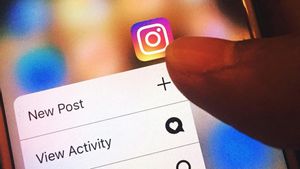JAKARTA - Connoisseurs of the horror-thriller genre always enjoy the zombie theme because it attracts attention. Zombie movies always tell how humans survive from the pursuit of zombies to the brutality of the undead when hunting humans.
Zombies are illustrated as undead that can prey on humans. The emergence of zombies usually begins with the spread of the virus. Humans who have been bitten by zombies will also turn into zombies and will turn into zombies too.
Generally, movies with zombie themes are always box office in the film industry. The films Train to Busan, Peninsula, Alive, World War Z, Kingdom and which are still being discussed by Netflix's All of Us are Dead are some of the most talked about Zombie-themed films.
Reporting from MedicalNewsToday, the word zombie itself first appeared in English in the 1800s. The word is in the work of a poet Robert Southey entitled History of Brazil.
The word zombie also appears in the Merriam-Webster dictionary associated with Louisiana or Haitian creole languages because it is similar to the word 'nzumbe' from Kumbundu which means ghost.

Spread of the Zombie virus
Zombies or undead often appear in films, literary works, or other imaginative works. The existence of zombies is considered a form of human ghost. But do zombies actually exist?
Reporting from Live Science, Harvard Medical School professor and psychiatrist, Dr. Steven Schlozman, trying to explain the phenomenon of the zombie outbreak from a scientific point of view. Of course, as a doctor, it would be nearly impossible for Schlozman to watch a zombie movie without diagnosing their neurological problem. Schlozman emphasized in advance that zombies are unreal creatures.
Schlozman said that the symptoms of being a zombie, as shown in the film, are not easy to find links to the outbreaks that epidemiologists fear in the real world. However, the pattern of a pandemic can be represented quite neatly on a graph, whether it is spreading slowly or rapidly, through splattered brains or air droplets.
"Every infectious disease that spreads has a certain mathematical way of spreading it," explains Schlozman. Viruses that are transmitted through bites, such as the rabies virus, don't spread quickly because they can be isolated.
Meanwhile, the spread of viruses that are transmitted through the air, such as influenza, can spread quickly in an area. "All the pandemics we experience on Earth typically spread through the air," said Schlozman.
Real world Zombies

Zombies do exist, but not in humans but in other creatures, namely ants, especially tropical wood ants. If in fiction, zombies are infected with a virus or bacteria, then in tropical wood ants the zombies are caused by a parasitic fungus.
Launching on the Ministry of Education and Culture's Instagram, Ri, professor of entomology and biology from Pennsylvania State University, David Hughes, explained that the zombie ant phenomenon is caused by a parasitic fungus called Ophiocordyceps Unilateralis.
The parasitic fungus will infect the body of the ant that touches it. Then, it will fiddle with muscles, consume internal organs, and damage the ant's brain system. As a result, the ant's body is controlled and made to behave normally like a healthy ant before slowly killing it.
Ophiocordyceps unilateralis will grow a stroma (mushroom stalk) from the back of the head of a dead ant.
Killer Zombie Ants
The life goal of "Ophiocordyceps Unilateralis" is to kill healthy ant colonies. Especially the ants that are in a favorable environment. On the other hand, this cannot be done from within the colony because ants really keep their environment clean.
As they mature, the stroma or stalk of the zombie ant fungus will spread toxic spores to kill a healthy colony of ants. However, it is important to note that this Ophiocordyceps Unilateralis cannot turn humans into zombies, as it is only capable of infecting ants.
The English, Chinese, Japanese, Arabic, and French versions are automatically generated by the AI. So there may still be inaccuracies in translating, please always see Indonesian as our main language. (system supported by DigitalSiber.id)








